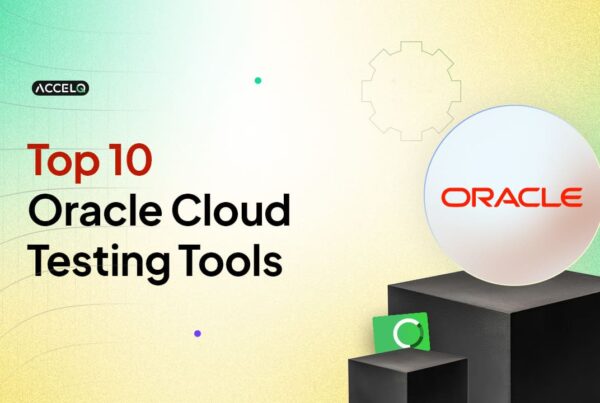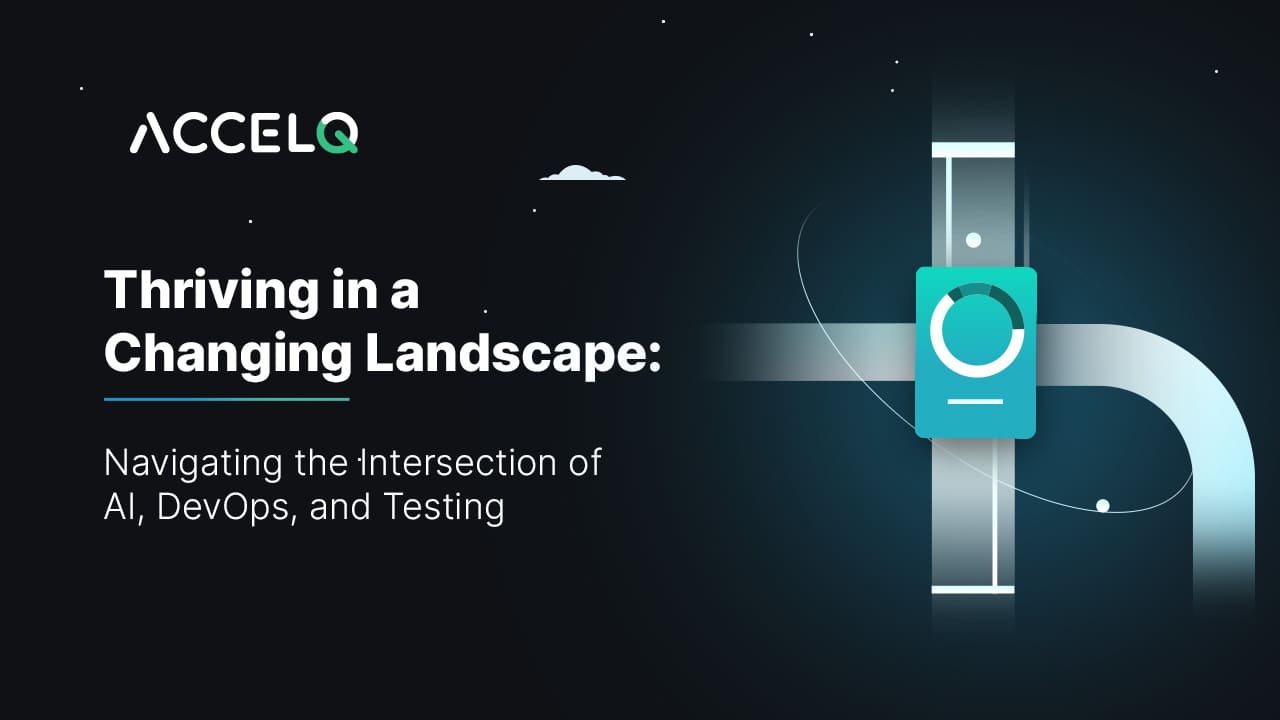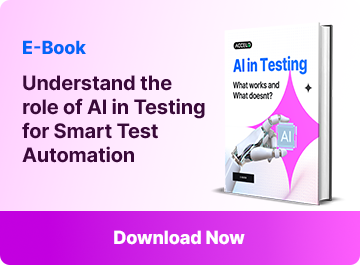AI in DevOps: Software Testing with Intelligent Automation

The incorporation of artificial intelligence in DevOps is becoming increasingly important as software development expectations keep growing. Though successful, the complexity and speed demanded in contemporary development cycles push traditional DevOps methods to their limitations. Artificial intelligence (AI) is filling in to improve existing methods by including intelligent decision-making, predictive analytics, and automation in the DevOps stream.
This blog will explore how artificial intelligence is changing DevOps so that companies may speed delivery, lower mistakes, and streamline their operations.
Role of AI in DevOps
AI transforms DevOps by automating activities, predicting issues, and improving decision-making. This integration introduces intelligence into the development process, increasing productivity and eliminating errors.
- By streamlining code reviews and implementations, artificial intelligence removes human error.
- Using machine learning and artificial intelligence forecasts avoids infrastructure management problems.
- AI provides insights, optimizes resources, and finds bottlenecks by analyzing DevOps data.
- AI tools help to coordinate development-operations communication.
Key Areas Where AI Enhances DevOps
Integrating AI in DevOps transforms several key areas, making processes more efficient, reliable, and scalable. Below are the main areas where AI is having a significant impact:
1. Automated Code Review and Quality Assurance
ACCELQ’s Autopilot and AI-driven test automation tools automate the identification of code flaws, vulnerabilities, and inefficiencies, transforming code review and quality assurance through intelligent, self-learning mechanisms.
Analyzing past data, machine learning techniques find trends and project possible problems before they affect the system. This accelerates the review process and guarantees better code quality.
For Instance, AI-powered tools can automatically indicate regions needing more testing and recommend code enhancements, saving developers time spent on hand code review.
2. Continuous Integration and Continuous Deployment (CI/CD)
AI for DevOps has significantly improved the CI/CD pipeline by automating testing, integration, and code deployment.
Based on previous data, artificial intelligence systems can forecast the success of installations, spot possible problems, and even reverse deployments should something go wrong. This results in faster and more dependable releases, lowering downtime and guaranteeing flawless update delivery.
Furthermore, optimizing the testing schedule and guaranteeing that the most critical tests are conducted first helps machine learning models lower the time to deployment.
3. Infrastructure Management and Monitoring
Managing infrastructure is difficult work that requires continuous monitoring and updates. Artificial intelligence may automate infrastructure management through consumption pattern prediction, resource allocation optimization, and anomaly detection before they create problems.
For instance, AI-powered solutions can automatically scale resources up or down depending on demand, guaranteeing effective system operation free from over-provisioning. This lowers running expenses and increases system dependability.
4. Incident Management and Root Cause Analysis
Minimizing downtime from arising problems depends on quickly identifying the fundamental cause. Artificial intelligence can improve event management through automatic detection, classification, and suggestion of possible remedies.
Machine learning algorithms examine logs, performance measures, and previous events to find trends and connections that might not be immediately clear to human operators. This speeds up root cause analysis and facilitates teams' speedy resolution of events.
How Does AI Work in DevOps?
AI integration in DevOps is the application of machine learning models, and algorithms meant especially to manage the complexity and scope of contemporary software development and operations. The following is a technical analysis of how artificial intelligence runs at several phases of the DevOps life:
1. Data Collection and Preprocessing
DevOps artificial intelligence systems start by gathering enormous volumes of data from many sources, such as logs, performance measures, code repositories, deployment pipelines, etc. Preprocessing this data guarantees relevancy, consistency, and quality.
For instance, log data might be cleaned to eliminate duplicates, and metrics data might be normalized to guarantee consistency. This preprocessing is crucial for training proper machine learning models.
2. Model Training and Optimization
Once the data is ready, it is applied to train machine learning models. These models identify trends and project results and offer analysis grounded in past performance.
For instance, in a CI/CD pipeline, a model might be taught to forecast a project's success or failure using past deployment data. Training entails choosing the correct algorithms, such as neural networks or decision trees, and refining them using hyperparameter optimization and cross-valuation methods.
3. Real-Time Monitoring and Analysis
Following training, artificial intelligence models are put into the DevOps environment, constantly checking systems and evaluating real-time data. These models can identify abnormalities and project resource requirements and even foretell possible breakdowns before they start.
For instance, an artificial intelligence model might track server CPU consumption and forecast when it surpasses a crucial threshold, prompting a proactive scaling action. This real-time study helps DevOps teams address problems before they become more serious, guaranteeing better operations.
4. Automated Decision-Making
One of the most powerful features of artificial intelligence (AI) in DevOps is its capacity to make independent judgments. Drawing on the insights the data provides, AI can trigger automated responses, including task reassignment, infrastructure scalability, and undoing defective deployments.
For instance, to lower the risk of downtime, a model can immediately stop the deployment process and notify the team should it find a high probability of failure in a deployment. These automatic choices are grounded in pre-defined guidelines and ongoing learning by the artificial intelligence system.
5. Continuous Learning and Improvement
The last stage of the artificial intelligence development process is ongoing education and improvement. AI models develop by learning from past mistakes and fresh data, and they are not fixed. This ongoing education guarantees that the models improve over time, increasing their accuracy and efficiency in their forecasts and actions.
For example, after several iterations of learning from fresh data, a model that once was 70% accurate in forecasting deployment failures might rise to 90% accuracy. Artificial intelligence's main difference from the DevOps process is its self-improvement capacity.
Future of AI in DevOps
The future involves enhanced integration, facilitating advanced automation and intelligence throughout the development pipeline. Notable technological progress includes:
- End-to-End Automation: Artificial Intelligence (AI) will completely automate the DevOps pipelines, covering all stages from code commits to deployments. This automation will enhance operations by utilizing real-time data analysis.
- Proactive Incident Management: Artificial Intelligence (AI) will use pattern identification in resource utilization data to forecast and address events before they impact production.
- Dynamic Resource Scaling: Artificial intelligence will enhance infrastructure by dynamically adapting resources according to demand, improving efficiency, and diminishing expenses.
- IoT and Blockchain Integration: It will handle intricate DevOps environments, guaranteeing secure and scalable operations.
- Adaptive Test Automation: Artificial Intelligence (AI) will generate adaptive test cases, enhancing test coverage and efficiency by considering the changing code and historical data.
Challenges of Integrating AI in DevOps
Although incorporating artificial intelligence into DevOps has many advantages, companies must solve many issues to fully utilize its possibilities.
1. Data Quality and Availability
AI systems require huge amounts of high-quality data for efficient operation. DevOps uses logs, performance analytics, and deployment histories. Keeping this data clean, consistent, and accessible is difficult. Poor data quality can cause erroneous forecasts, unreliable automation, and AI-DevOps pipeline inefficiency.
2. Integration Complexity
AI integration into DevOps processes and tools can be challenging. DevOps environments often use legacy and new tools, making integration problematic. Companies must ensure that AI systems can work with all pipeline components without disturbance. This sometimes demands specialized solutions and major infrastructure changes.
3. Algorithm Transparency and Bias
AI algorithms can be opaque, making decision-making difficult to comprehend. Lack of transparency can foster mistrust among team members and stakeholders. If the training data is biased, the AI system may repeat similar biases in its predictions and actions, resulting in skewed outcomes and erroneous conclusions.
4. Scalability and Performance
Increasing AI model complexity necessitates increased processing power and resources. Scaling these models in DevOps is difficult. AI system performance must be monitored to avoid DevOps pipeline bottlenecks that hinder deployments and other essential procedures.
Conclusion
DevOps AI automates procedures, improves accuracy, and improves decision-making, revolutionizing the software development lifecycle. Data quality and integration complexity are obstacles to AI's full DevOps efficiency potential. AI will improve DevOps speed and reliability as it evolves.
For companies aiming to streamline DevOps with intelligent automation, ACCELQ offers powerful AI-driven solutions to stay competitive. Find out how ACCELQ can improve your DevOps today with our demo.
Discover More
 How To Accelerate Your Salesforce Career
How To Accelerate Your Salesforce Career
How To Accelerate Your Salesforce Career
 Top Oracle Cloud Testing Tools for 2026: Curated List
Top Oracle Cloud Testing Tools for 2026: Curated List


































